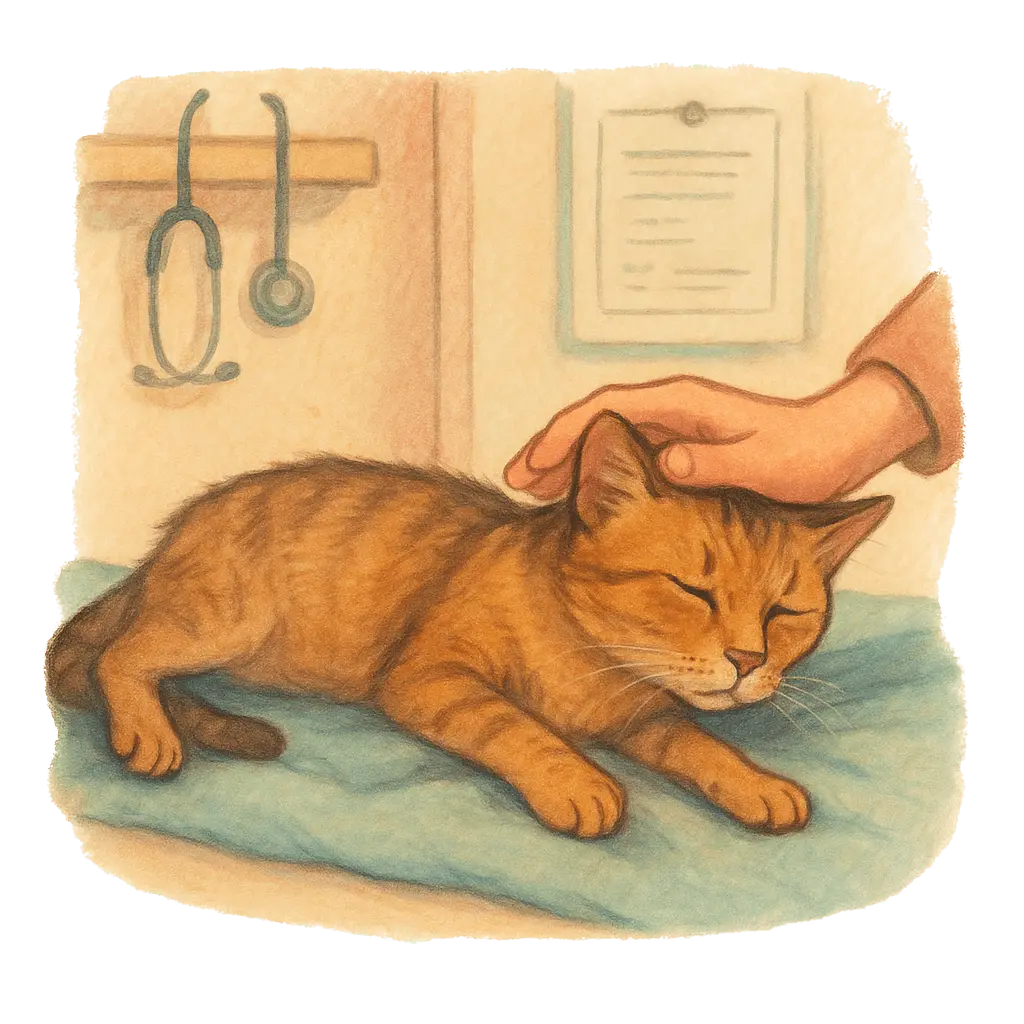Should I Euthanize A Paralyzed Cat? 5 Questions to Ask Yourself
 Jul 03, 2025
Jul 03, 2025

Euthanizing cats is one of the hardest decisions pet parents have to make. It's a humane death that is recommended when a cat is suffering from severe illness or chronic disease that cannot be cured or managed.
But, for an emotional pet parent, the real question is, should I euthanize a paralyzed cat? They are left with no other option.
The other important question is when is the right time for cat euthanasia?
In this blog, we’ll cover five things you should consider when making this decision.
When to Euthanize a Paralyzed Cat?
A number of factors like a cat’s quality of life, your ability to offer long-term support, etc., play an important part in deciding the right time for euthanizing.

Here are the things that you should consider:
Question 1: How Much Do You Know About Euthanizing?
Getting knowledge about paralysis and euthanizing is essential to make the right decision for your cat. This will help you determine the type of paralysis, such as laryngeal paralysis in cats.
You can start by conducting online research to get basic information. Search for topics like “What is cat euthanization?”, “Will euthanization cause pain to the cat?” etc.
In addition to researching online, discuss with veterinarians. They’ll help you better understand the topic, allowing you to ask questions and share your concerns.
Question 2: Is Your Feline Fellow Anxious?
Frequent anxiety is a clear indicator of severe internal pain. If you notice your cat being uneasy, bothered, or nervous most of the time, even after the vet visits, it’s time to take their condition seriously.
You should discuss their increased anxiousness with a qualified vet. They might prescribe medications or suggest you consult a pet counselor for a personalized behavioral treatment plan. Or… euthanization!
Question 3: Can You Offer Optimal Care in the Future?
Paralyzed cats need continuous care. You must always be with your cat when they eat, play, or bathe. A minor inconsistency or lack of attention can worsen the condition.
Pet parents have to decide whether they can provide long-term care to their cats.
Will you be emotionally and physically available for your cat? Or do you have the budget for future medications and appointments?
Even if you’re hiring a caretaker, you’ve got to be present to ensure everything works smoothly. Think strategically and then decide what’s best for your pet.
Question 4: What’s the Quality of Your Pet’s Life?
Is your pet’s life worsening day by day?
Or are you noticing they feel lethargic or frequently losing weight?
If the answer is yes, your cat might be inhaling their last breath. Assess your cat’s quality of life. This is the best way to determine how much a cat is suffering.
If medications have stopped showing their results or the surgery has drastically affected the quality of life, you might want to end the pain for your cat.
Question 5: Are You Emotionally Prepared for This?
Letting go of your cat can be traumatic.
If you aren’t ready for this emotional damage, wait for a while and prepare yourself. Get counseling and join pet healing groups to find friendly support.
In addition, we’d also recommend reading specific books to prepare and heal yourself.
Here are some best-selling books you can get:
- When You Have to Say Goodbye: Loving and Letting Go of Your Pet by Monica Mansfield.
- Healing Wisdom for Pet Loss: An Animal Lover's Guide to Grief by Anne Marie Farage-Smith, LMHC.
- When Your Pet Dies: A Guide to Mourning, Remembering and Healing by Alan D. Wolfelt, PhD.
Once you’re ready to endure the loss of your pet, you can consult a veterinarian for euthanizing. But make sure it isn’t too late.
How to Care for a Paralyzed Cat?
If your cat is paralyzed, taking good care is important to make it feel happy and comfortable.
Proper diet plans, regular exercise, and playtime cuddling can help ease their anxiousness and pain.
Here are some tips for you to follow:
- Provide high-nutrition food.
- Provide a warm and stress-free environment.
- Spend quality time with your cat to provide comfort.
- Maintain the airway and ensure your cat can breathe freely.
- Use a sturdy and supportive carrier for transport.
- Consider regular check-ups, medication, and rehabilitation.
- Regularly reposition your cat to prevent skin breakdown.
- Bring a quality wheelchair to improve mobility and quality of life.
- Consider exercises and massages to maintain muscle tone.
- Regularly monitor bladder workflow or catheterization as directed by your vet.
- Prioritize regular cleaning and grooming to prevent infections.
- Monitor bowel movements and assist with elimination if necessary.
Make sure to consult a veterinarian for a proper care plan. They will provide you with specialized plans that focus solely on your pet’s needs.

Final Words!
Euthanizing a cat isn’t easy. And in this guide, you must have got an answer to the question, “When should I euthanize a paralyzed cat?”
You’ve to go through emotional pain and trauma to reach your final decision.
Throughout this journey, an experienced vet can help you cope with your tragic loss and provide you with tips to heal and gather yourself.
If you’re ready to discuss with an expert, join VetPet Central.
We offer 24/7 telemedicine services, enabling you to schedule appointments anytime.
Whether you want an expert opinion on euthanizing or emotional counseling sessions, our veterinarians can help.
FAQs
Will my cat undergo pain during euthanization?
Generally, euthanizing a cat isn’t painful. Veterinarians usually inject a drug to stop their heart’s beating within seconds. Before administering the medication, vets might inject a sedative to keep them relaxed during euthanizing.
Can my cat wake up after euthanization?
No, they cannot wake up during or after euthanization. They might, however, have slight movements due to the injections and medications.
Is there a registration fee for using VetPet Central?
No. There is no registration or membership for VetPet Central. However, you must pay your vet's fee. For more information, contact VetPet Central via phone or email.




